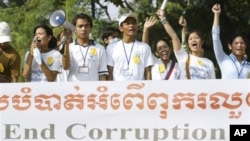PHNOM PENH - Cambodia is the one of the least competitive countries in the region, hampered by corruption, a poorly educated workforce and inefficient government, according to a recent study.
The annual Global Competitive Index, conducted by the World Economic Forum, showed a large uptick in reported corruption for doing business in Cambodia, putting it behind many of its neighbors within Asean, though Burma and Laos were not included in the index.
Among surveyed respondents for 2012, 21.5 percent reported corruption, up from 16.8 percent the previous year.
Yim Sovann, a spokesman for the opposition Sam Rainsy Party, said the numbers reflect the reality in Cambodia.
“Corruption not only causes a loss to the national budget, but it’s a challenge to economic development, a challenge to administration,” he said. “It makes some investors frustrated and inconvenienced by investing in Cambodia.”
However, government spokesman Phay Siphan said that while corruption exists in Cambodia, “we are still good” compared to other countries—a statement contrary to the findings of the survey. “If we look at the business registration in Cambodia, we still have a high rate,” he said.
Cambodia has in fact improved its standing worldwide on the index. Amid 144 countries included on the index, Cambodia has climbed from 109th least competitive in 2010 to 85th least competitive in 2012.
Improvements have come amid its institutions and infrastructure, its macroeconomics and in health and primary school education, according to the survey. Cambodia has also improved in efficiency and innovations for investors.
Meanwhile, officials said separately that Cambodia is poised to benefit even further in the region once Asean integration improves. Asean wants to see a connected region in infrastructure and other mechanisms by 2015.
At an integration symposium in Phnom Penh in October, Sok Siphana, an economic adviser to the government, said a fully connected region will make Cambodia even more attractive to investors, due mostly to its low costs of production.
But it is lacking in other areas.
“Cambodia needs good connectivity, such as a road system,” Fukunari Kimura, chief economist for the Economic Research Institute for Asean, said at the symposium.
Cambodia has less than 10 percent of its roads paved, for example, according to Asean statistics.
The annual Global Competitive Index, conducted by the World Economic Forum, showed a large uptick in reported corruption for doing business in Cambodia, putting it behind many of its neighbors within Asean, though Burma and Laos were not included in the index.
Among surveyed respondents for 2012, 21.5 percent reported corruption, up from 16.8 percent the previous year.
Yim Sovann, a spokesman for the opposition Sam Rainsy Party, said the numbers reflect the reality in Cambodia.
“Corruption not only causes a loss to the national budget, but it’s a challenge to economic development, a challenge to administration,” he said. “It makes some investors frustrated and inconvenienced by investing in Cambodia.”
However, government spokesman Phay Siphan said that while corruption exists in Cambodia, “we are still good” compared to other countries—a statement contrary to the findings of the survey. “If we look at the business registration in Cambodia, we still have a high rate,” he said.
Cambodia has in fact improved its standing worldwide on the index. Amid 144 countries included on the index, Cambodia has climbed from 109th least competitive in 2010 to 85th least competitive in 2012.
Improvements have come amid its institutions and infrastructure, its macroeconomics and in health and primary school education, according to the survey. Cambodia has also improved in efficiency and innovations for investors.
Meanwhile, officials said separately that Cambodia is poised to benefit even further in the region once Asean integration improves. Asean wants to see a connected region in infrastructure and other mechanisms by 2015.
At an integration symposium in Phnom Penh in October, Sok Siphana, an economic adviser to the government, said a fully connected region will make Cambodia even more attractive to investors, due mostly to its low costs of production.
But it is lacking in other areas.
“Cambodia needs good connectivity, such as a road system,” Fukunari Kimura, chief economist for the Economic Research Institute for Asean, said at the symposium.
Cambodia has less than 10 percent of its roads paved, for example, according to Asean statistics.







